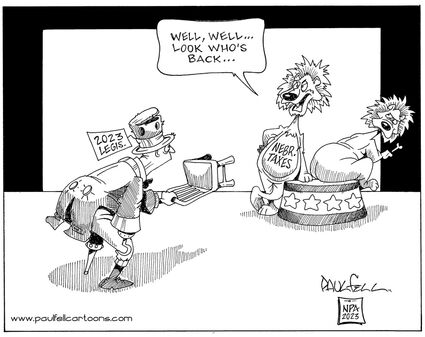School finance meets property tax relief
February 23, 2023
His predecessor spent eight years pushing property tax relief. Now, Governor Jim Pillen wants to clearly tie said property tax relief to school finance. It's up to the legislature to figure out how to make that work.
Lawmakers are used to people complaining about property taxes. Now, throw in some school districts that say a proposed distribution of state aid isn't fair and equitable. What do you have? A real mess or a problem begging for a solution?
Pillen is behind three priority measures carried by three senators to implement the plan. He said the bills would increase the state's investment in education and reduce school reliance on property taxes, calling them the culmination of great teamwork from groups representing statewide stakeholders
One bill, introduced by Senator Rita Sanders of Bellevue, calls on the state to allocate $1,500 annually for every K-12 public school student through the Tax Equity and Educational Opportunities Support Act. The increase amounts to nearly $113 million in state aid. In addition, the bill proposes a statutory provision that 80% of special education funding be covered through a combination of federal and state funding.
Sen. Rob Clements of Elmwood proposed legislation to create the education future fund, which allocates $1 billion of state general funds during the 2023-2024 biennium and $250 million each year afterward for the purposes of funding that $1,500 per student as well as: special education; grants to retain licensed teachers; fund further career and technical training and mentoring for K-12 students.
Albion Sen. Tom Briese has a bill that would create a 3% cap on property tax revenue that a school district receives. It is a soft cap that can be overridden by 75% of voting school board members or the approval of 60% of the district's registered voters, should there be a need.
With the cap, district property tax request authority would be determined by subtracting non-property tax revenue from the total revenue limitation. The cap would not apply to property tax revenues required to pay bonded indebtedness. Non-property tax revenue would not include special education funding. A school district may exceed its property tax authority, with a 75% majority vote of the school board.
Additionally, a district may exceed their property tax request authority by any amount with a 60% vote of the people.
Briese admits that the rest of the package won't likely pass without agreement on the cap. Aye, there's the rub. Lids and caps have been fighting words in government and education for decades. An initial reading of this measure doesn't appear to be all that different.
OpenSky Institute Executive Director Dr. Rebecca Firestone said that while the think tank appreciates the governor's interest in increasing state aid to public education and investing more in our state's children, there needs to be some caution.
"We have long noted that the best way to address property taxes in Nebraska is to increase the share of state support for public K-12 education," she said after the package was introduced.
While some aspects of the package – such as proposed increases in state public education funding – could help address key state needs, their combined fiscal impact could lead policymakers to dip into the state's cash reserve, she said later after a brief analysis of the bills. "This is concerning because the state's cash reserve is meant to be used for 'rainy days' – typically one-time expenditures that serve key state needs in times of economic downturn," she said.
Some education leaders have also noted inequities in funding among same-size districts. To say nothing of the lids which have gained a questionable history in Nebraska as local governments and school districts have found ways around them.
So here we go again. Let's hope it can be different this time around. But I still think it will take a miracle to put all the pieces together just to pass legislative muster, let alone work in the real world.
J.L. Schmidt has been covering Nebraska government and politics since 1979. He has been a registered Independent for more than 20 years.



Reader Comments(0)